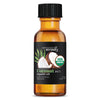
Is MCT Oil the Same as Fractionated Coconut Oil? Our Experts Answer
When browsing carrier oils for essential oil blending or personal care recipes, two names often pop up side by side: MCT oil and fractionated coconut oil. While the two are closely related—and often used interchangeably—they're not exactly the same. Understanding the difference can help you choose the right oil for your specific needs, whether you're crafting a massage blend, a body oil, or a diffuser-safe dilution.
Let’s break down how these oils compare in terms of source, composition, texture, shelf life, and best uses.
What Is MCT Oil?
MCT stands for medium-chain triglycerides, a type of fat naturally found in coconut oil and palm kernel oil. MCT oil is a refined oil made by isolating and concentrating those medium-chain fatty acids, primarily caprylic acid (C8) and capric acid (C10). These chains are shorter than the long-chain triglycerides (LCTs) found in many other oils, which contributes to MCT oil’s lightweight, easily absorbed character.
MCT oil is clear, odorless, and remains liquid at room temperature. It’s commonly used in both skincare and aromatherapy because of how quickly it absorbs into the skin without leaving a greasy residue. Its stable shelf life and resistance to oxidation make it a reliable choice in formulations where consistency and longevity matter.
Some MCT oils may also include lauric acid (C12), though highly refined MCT oils often exclude this fatty acid to further enhance their fast-absorbing qualities. MCT oil is versatile, but always check the label for specific fatty acid content and sourcing—especially if you're looking to avoid palm-derived ingredients.
What Is Fractionated Coconut Oil?
Fractionated coconut oil is a specific type of MCT oil that is derived solely from coconut oil. Through a process called fractionation, the long-chain fatty acids are removed, leaving behind only the medium-chain triglycerides. This results in an oil that is liquid at all temperatures, unlike traditional virgin coconut oil, which solidifies in cooler environments.
Fractionated coconut oil generally contains the same key MCTs—caprylic and capric acids—but can sometimes retain a small amount of lauric acid, depending on the product. It’s valued for being non-comedogenic, non-greasy, and highly stable, with an ultra-light texture that absorbs well into the skin.
Because it’s coconut-based, fractionated coconut oil may also appeal to those who prefer a more natural or sustainably sourced alternative to palm-based MCT oil. It’s commonly found in lotions, balms, hair treatments, and massage blends due to its skin-friendly qualities and neutral scent.
Key Differences Between MCT Oil and Fractionated Coconut Oil
While the two oils are often used similarly, there are subtle distinctions worth knowing:
Feature |
MCT Oil |
Fractionated Coconut Oil |
|
Fatty Acid Content |
Pure MCTs (C8 and C10) |
MCTs (C8, C10; C12) |
|
Color & Scent |
Clear, odorless |
Clear, odorless |
|
Texture |
Very light, fast-absorbing |
Light, slightly silkier |
|
Use in Skincare |
Absorbs quickly |
Moisturizing and stable |
|
Source |
Coconut and/or palm kernel |
Coconut only |
|
Labeling |
May vary in transparency |
Labeled as coconut-based |
In essence, all fractionated coconut oil is MCT oil, but not all MCT oil is fractionated coconut oil. MCT oil may be blended from both coconut and palm sources or refined to highlight specific fatty acids. Fractionated coconut oil, on the other hand, is a consistent and reliable choice when coconut sourcing is preferred or required.
When to Use MCT Oil vs. Fractionated Coconut Oil
If you’re curious about when to use MCT oil or fractionated coconut oil, we’ve broken it down for you below.
For Essential Oil Blends
Both oils are excellent choices for diluting essential oils. Their odorless, non-greasy nature means they won’t interfere with the aroma or texture of your final blend. MCT oil is slightly lighter, making it a great base for ultra-quick absorption in aromatherapy roll-ons or diffuser-safe formulations.
Fractionated coconut oil is particularly popular in rollerball applications, massage oils, and sprayable body blends because it glides smoothly and leaves a soft, silky finish on the skin. It’s also ideal for layering under makeup or skincare without causing pilling or clogging pores.
For Skincare
MCT oil and fractionated coconut oil are both suitable for facial oils, body lotions, and serums. Their non-comedogenic nature makes them great options for people with breakout-prone or sensitive skin.
Fractionated coconut oil may offer a touch more hydration and occlusion, which can help prevent water loss in dry environments. MCT oil, with its rapid absorption, can be an excellent carrier for essential oils in facial serums where a lighter finish is desired.
As with any new product, it’s best to do a patch test before applying oils to larger areas of skin to check for any adverse reactions.
For Hair Care
Fractionated coconut oil is often preferred for hair and scalp applications. It coats strands without the heaviness of virgin coconut oil and won’t solidify in cooler temps. It’s ideal for use in:
-
Leave-in conditioners
-
Scalp massage oils
-
Frizz-taming serums
-
Hair masks and treatments
MCT oil can also be used in hair blends, especially for lightweight formulas aimed at quick scalp absorption or oily hair types.
How to Choose the Right Oil for Your Routine
When choosing between MCT oil and fractionated coconut oil, consider:
-
Your intended use: For essential oil dilution, either will work well. For hair and body care, fractionated coconut oil is often the go-to.
-
Your texture preference: MCT oil is the lightest option. If you want a fast-absorbing finish with minimal residue, it’s a strong pick.
-
Your source preference: If you're avoiding palm-derived products, choose a fractionated coconut oil clearly labeled as coconut-based.
-
Label transparency: Always check product details for the source of the oil, its composition, and its intended uses.
Wholesale Botanics offers Fractionated Coconut Oil as part of their carrier oil lineup, making it easy to create smooth, stable blends without compromising the benefits of your essential oils.
Final Thoughts: Is MCT Oil the Same as Fractionated Coconut Oil?

While MCT oil and fractionated coconut oil share many properties—and are often used for the same purposes—they’re not completely identical. Fractionated coconut oil is a type of MCT oil, specifically sourced and processed from coconut to retain its liquid form and light texture.
Both oils are excellent in their own right, and the best one for you depends on your formulation goals, ingredient preferences, and how your skin or hair responds. For most users looking for a gentle, nourishing base oil, fractionated coconut oil checks all the boxes—and then some.
